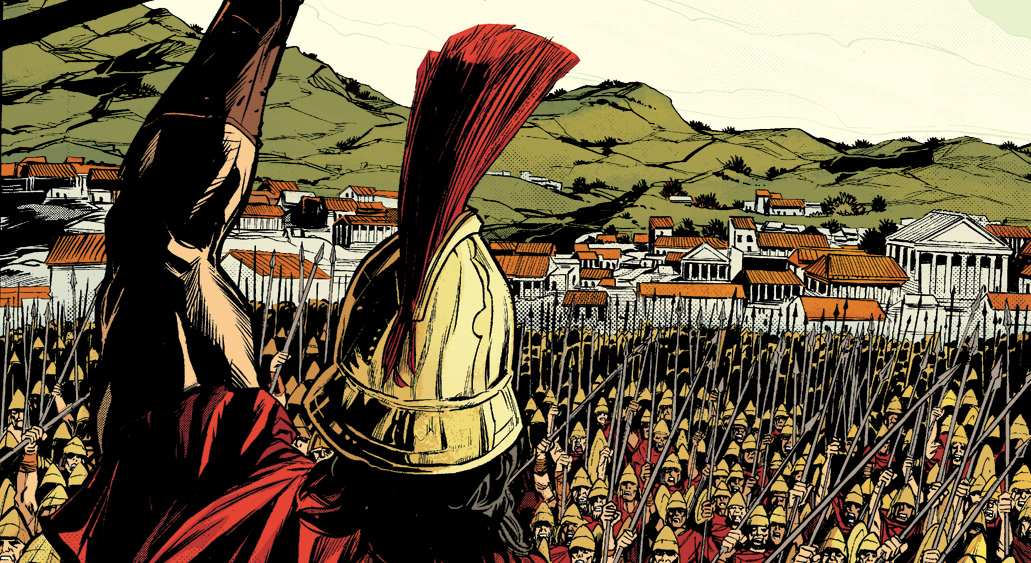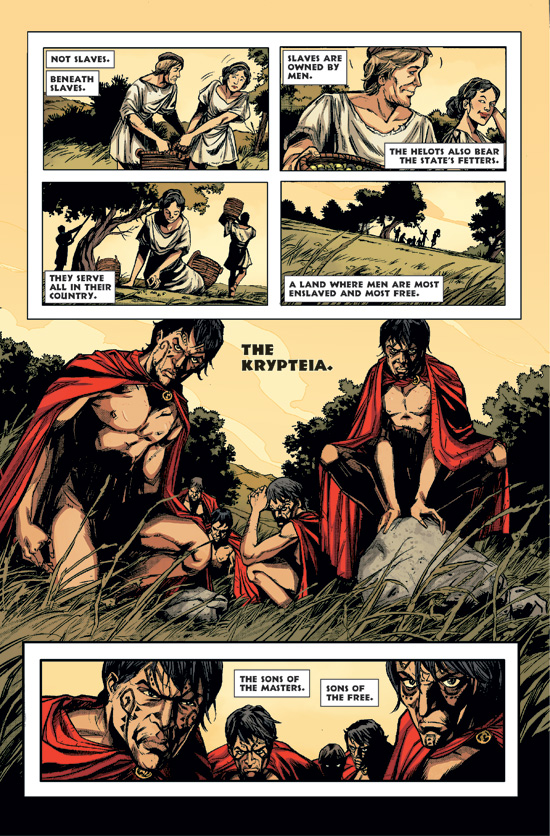
April 24, 2014, by Tara de Cozar
Comics and classics part two — Helots and Spartans
Comics writer Kieron Gillen spoke at the Classical Association annual conference, held at the University at the end of April. Prof Stephen Hodkinson was the historical consultant on his recent comics series Three. I’m writing a series of posts on their roundtable discussion ‘Story telling and historical authenticity in a visual medium: the comics series Three’. The original post is here.
Scripts and process
The panel started by outlining the scripts process. The business of scripting comics is an interesting one, and some comics writers post scripts once the final product is published. They’re an interesting read. You can see one of Kieron’s Phonogram ones here. Stephen was an extra layer in the usual comics scripting process. Kieron’s script would go to artist Ryan Kelly, who would draft roughs, which would then go to Stephen with Kieron’s script for comment.
Kieron described a comics script as: “The world’s most anal screenplay. The scripts tended to balloon when I was talking about anything vaguely historical and trying to explain what was going on. And I wanted to make it acceptable to current academic discourse.”
Stephen explained: “What we decided was that I would respect his authorial integrity and his right to make the final decision about the text in particular, but also the images. But that I would give my take on the authenticity of both the text and what I could glean about the images. I would go no holds barred in my comments, but then Kieron was free to take them up or not, or partly take them up as he wished. The whole project was Kieron’s conception from the start, and I’d come in at the stage when the concept had been developed.”
An example of the collaboration comes from one of the earliest pages in issue one, setting the scene for the the whole story and explaining the Helots’ relationship to the Spartans.

“The Helots also bear the state’s fetters” was a line subject to debate, as you can see from the original script and Stephen’s comments below.
“This was an example of no holds barred comment,” said Stephen. “I was commenting on the caption “Helots were owned by the state”. That is controversial now. This comment was about how it’s moving towards private property of individual Spartans.”
“Helots — owned by the state — that’s the pop history version,” Kieron added. “I didn’t want to disrupt that for readers with that view. At the same time I don’t want to be wrong. ‘Also bears the state’s fetters’ was my shorthand version, which I was very happy with. It was a really lovely example of how the back and forth worked.”
An audience member then asked if Three would’ve been a different comic if Stephen had been involved earlier in the process.
Kieron: “I think it would’ve definitely changed the nature of the beast in some ways. My process of researching and writing Three — the first draft was done before I’d even spoken to Stephen. It was more, “is this OK and how can I work around this enormous historic error I’ve made?” I’d gone through what I’d wanted in the very basic literature and ripped those chunks out. My problem is, if I’ve taken directly from Plutarch, my interpretation’s awful. And writers tend to go automatically to the largest possible expression of any statement. You’re not trying to moderate. When you read pop history articles they tend to go to the strongest statement.”
I’ll post more on the discussion over the next few days.
No comments yet, fill out a comment to be the first


Leave a Reply